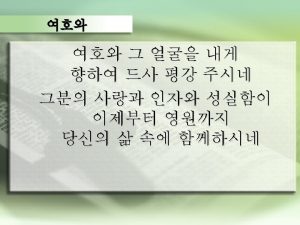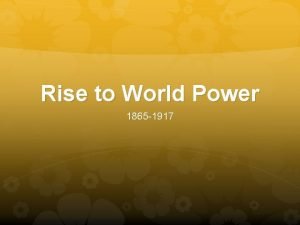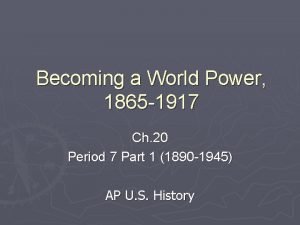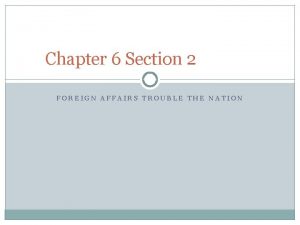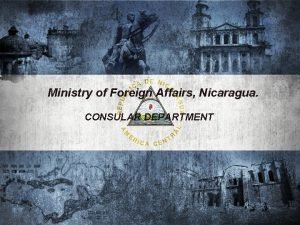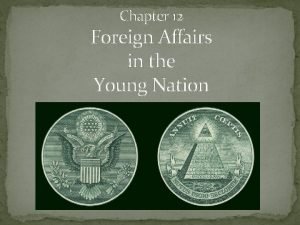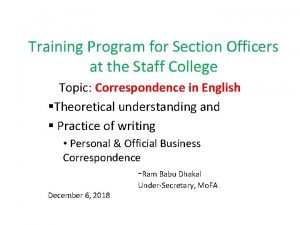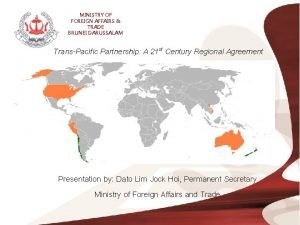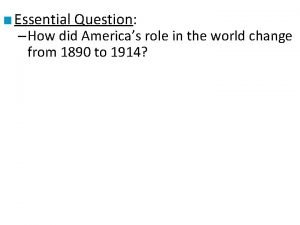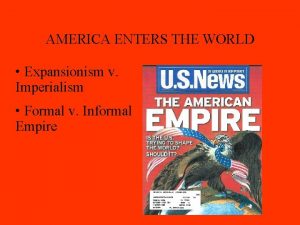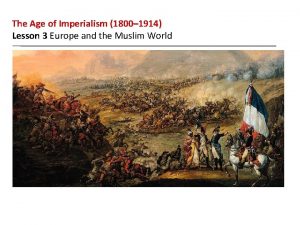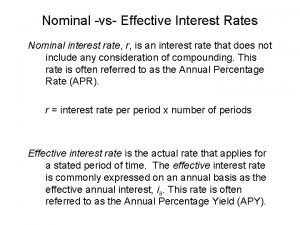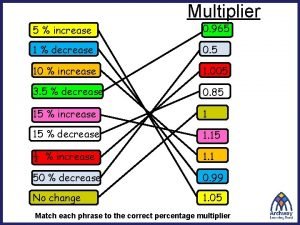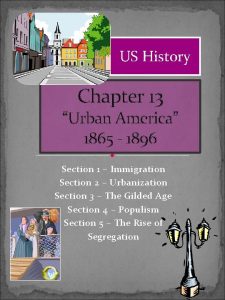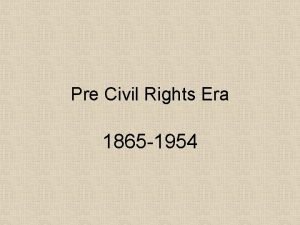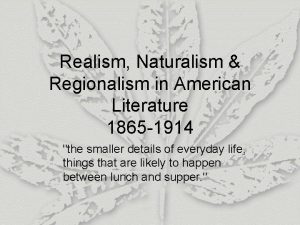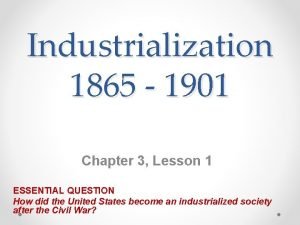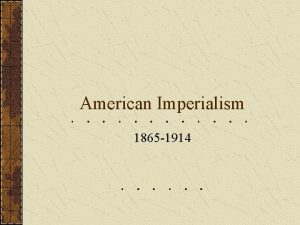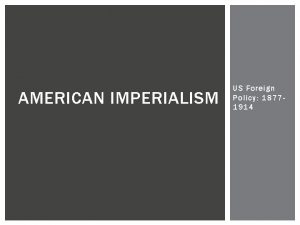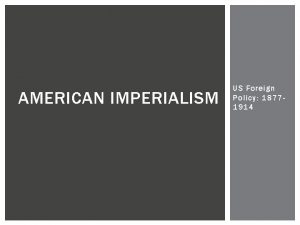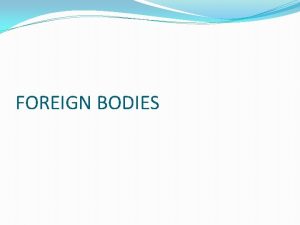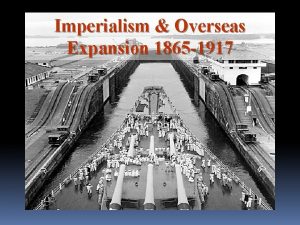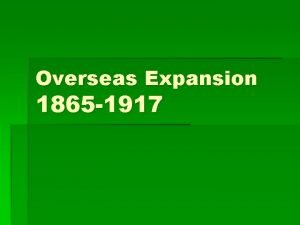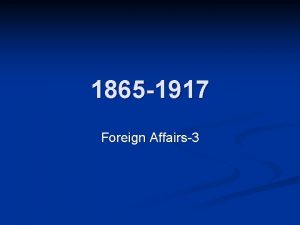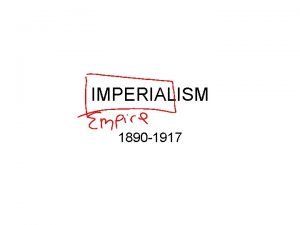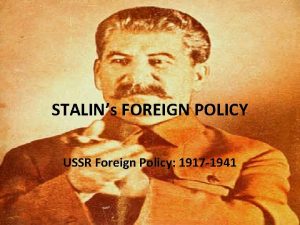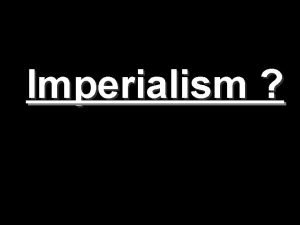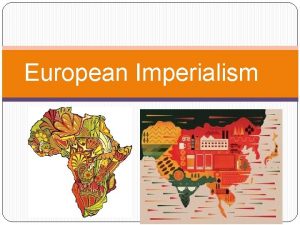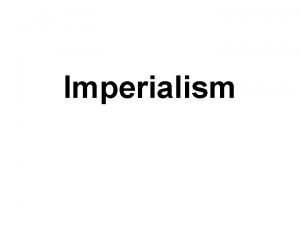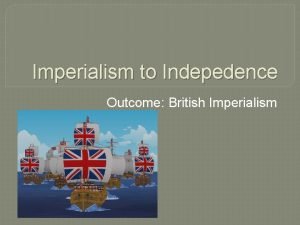1865 1917 Foreign Affairs Imperialism More interest in

























- Slides: 25

1865 -1917 Foreign Affairs Imperialism

More interest in World Affairs Need for new markets n Fear of need for more resources n American industries abroad…(lower wages= more $) n Growth of trade = an interest in World Affairs: n Some wanted colonies n Some wanted world power status n Some wanted to teach the American Way n

Expansionism Manifest Destiny still worked n Social Darwinism still applied n Now: White Man’s Burden too n Colonies would expand markets; stimulate U. S. trade n By 19 th Century: Europe controlled 1/3 of the world n By WWII, 85% n

Supporting Literature n Westward Expansion Romance of the West n Wister, Twain n Scholarly: The Turner Thesis n n Imperialism n Mahan The Influence of Sea Power Upon History: as our navy grows, so does the need for colonies as coaling stations

Expansion v Imperialism n Louisiana Purchase……. Alaska n Texas annexation…………. . Hawaii n Mexican American War……Spanish-Am. War Both: Manifest Destiny & Social Darwinism

Alaska 1867 William Seward (Seward’s Folly) n Purchased Alaska from Russia for $7. 5 million n n 2 cents an acre Seal furs, gold, other minerals, oil, natural gas n Naval bases (later air bases) n 49 th State n

Conflict with Britain over Alaska U. S. v Canadian seal hunters n Both agreed to arbitrate n U. S. Lost $500, 000 in damages n Boundary agreement reached before 1898 gold was found n Much later int’l restrictions on seal hunting: U. S. , Britain, Russia, Japan n

Hawaii Late 1700’s…was used by Americans as a stop for water and supplies n Later: missionaries, traders, shopkeepers n By mid 19 th Century over ½ of native population had died (disease, firearms, liqueur) n By 1854 U. S. citizens in Hawaii only 5% of population but controlled most of the land n Others there: Chinese, Japanese, British, German, Portuguese n

U. S. Agreement with Hawaii n Treaty of Reciprocity: Hawaiian sugar to the U. S. duty free n U. S. could use Pearl Harbor as a naval base n Hawaii agreed not to yield its territory to other countries n Hawaiian economy tied to sugar exports n THEN…disaster!. . . Mc. Kinley Tariff n

Hawaii continued Mc. Kinley Tariff cost Islands $12 million n American planters in Hawaii passed the losses on to Hawaiian native laborers n 1891 Queen Liliuokalani challenged growing American control n Took power from King Kalakauna who allowed Americans to take the Island from Hawaiians n

Hawaii continued American planters wanted to be rid of the queen n 1893 A Revolution…caused by American planters pretended that it was a popular revolt n 1898 Leaders of the revolt asked U. S. to annex islands (If U. S. owned…no sugar tariff) n Cleveland saw through it and tried to restore the queen n

Other Pacific Islands By 1900 U. S. had acquired over 50 Pacific Islands n 1867 Midway n 1898 Wake n 1878 Samoa… 3000 miles south of Hawaii n 1889 Pago: Samoan harbor was shared in a tripartite with Germany and Britain n By 1899 U. S. and Germany bought Brits out n

China By 1790’s U. S. had established trade with China n Missionaries, Schools, hospitals, friendly n 1844 Treaty of Wanghia: Americans enjoyed special trading privileges n Soon, so did everyone else n Other countries encroaching on Chinese Territory…formed Spheres of Influence n

China continued China could not defend itself n Britain in Hong Kong n French in Indochina n Russia and Japan in Manchuria n Also others in China: Portuguese, Germany, etc n n U. S. concerned about trade

China continued n Chinese to U. S. to build Railroads n 1868 Anson-Burlingame Treaty: to aid in moving Chinese RR workers to come to U. S. n 1882 Chinese Exclusion Act: No more Chinese immigrants to U. S. and the Chinese already in U. S. could not become naturalized citizens

China n continued 1894 Japan made war on China Took Formosa n Demanded Korea’s independence n Other countries expanded spheres n U. S. alarmed (trade) n John Hay (Mc. Kinley’s Sec of State) issued Open Door Notes: Asked all countries involved in China to respect Chinese Territorial integrity: the Open Door Policy…ignored n

China n Note: The Open Door Policy was a revolutionary departure from traditional U. S. isolationist policy 1901 Boxer Rebellion: Young Chinese formed a secret underground society “the Boxers” committed to ousting foreigners. n Killed hundreds of foreigners, destroyed much foreign-owned property n

Boxer Rebellion 900 foreigners held out waiting for rescue for 7 weeks n Herbert Hoover (American self-made millionaire in China working on a dam project. He was an engineer) n International military force who had citizens in China invaded and defeated the Boxers n All but U. S. demanded reparations from Chinese government n

Japan Historically shut off from the rest of the world n Isolationist: allowed only one Dutch per year to trade n Emperor did not allow citizens to leave islands n American wanted trade, Supplies, Fresh water n 1854 President Fillmore sent Commodore Perry to Japan with guns and gifts to n

Japan continued Other countries did the same n Japan immediately modernized its navy n Had no natural resources n Went after China (Manchuria…clashed with Russia). n War with China 1894 n War with Russia 1904 -05 n 1905 Japan defeated Russian Fleet! n

Japan n continued Treaty of Portsmouth Negotiated by TR…later Nobel Peace Prize n Japan wanted: Korea, Russian Sphere of influence in China, Sakhalin Island $ n Japan got only Korea and Russian sphere of influence n Japan Angry…Anti-American riots in Tokyo n American Press “Yellow Peril” n San Francisco: segregated Japanese children in schools n

Japan continued With TR: 1907 Gentlemen’s Agreement n U. S. would stop segregating Japanese. American students if Japan would stop Japanese from coming to U. S. n n 1908 Root-Takahira Agreement: the U. S. and Japan agreed to stay out of each others’ influence in China

Taft in China n n n Violated the Root-Takahira Agreement Agreed to participate with other nations to build a RR across China Japan responded with a surprise: Treaty with Russia U. S. backed out of RR thing Dollar Diplomacy: Taft: the U. S. would use political (military) influence to protect American investments overseas

The Hague 1899 and 1907 n Diplomats from numerous nations agreed to discuss means to a lasting peace: Spend $ on food, not weapons n Encourage arbitration to settle disputes n Rules of civilized warfare n Note: These were diplomats, not necessarily heads of state (Germany and Japan and Italy lacked natural resources and colonies)

Africa 1904 U. S. citizen and wife were held for ransom by a Moroccan bandit! Razuli n France and Germany both in Morocco n To avoid U. S presence there, Morocco paid the ransom n Treaty of Algeciras: TR mediated a dispute between Germany and France in Morocco n
 More more more i want more more more more we praise you
More more more i want more more more more we praise you More more more i want more more more more we praise you
More more more i want more more more more we praise you Becoming a world power 1865-1917
Becoming a world power 1865-1917 Becoming a world power 1865-1917
Becoming a world power 1865-1917 Foreign affairs trouble the nation chapter 6 section 2
Foreign affairs trouble the nation chapter 6 section 2 Ministry of foreign affairs nicaragua
Ministry of foreign affairs nicaragua Lesson 12 foreign affairs in the young nation
Lesson 12 foreign affairs in the young nation Foreign affairs chapter 15
Foreign affairs chapter 15 Sample letter to minister of foreign affairs
Sample letter to minister of foreign affairs Ministry of foreign affairs and trade brunei darussalam
Ministry of foreign affairs and trade brunei darussalam Old imperialism vs new imperialism
Old imperialism vs new imperialism Old imperialism vs new imperialism
Old imperialism vs new imperialism Foreign policy imperialism
Foreign policy imperialism Foreign policy imperialism
Foreign policy imperialism Too foreign for here too foreign for home
Too foreign for here too foreign for home For which reason did persia attract foreign interest
For which reason did persia attract foreign interest Nominal v. real interest rates
Nominal v. real interest rates Types of interest rate
Types of interest rate 0 965
0 965 Urban america 1865 to 1896
Urban america 1865 to 1896 1954-1865
1954-1865 Al cruzar una planta de guisantes de flores purpura
Al cruzar una planta de guisantes de flores purpura Realism regionalism and naturalism
Realism regionalism and naturalism St helen’s smelting co v tipping (1865)
St helen’s smelting co v tipping (1865) Lesson 1 the rise of industry
Lesson 1 the rise of industry Renoir
Renoir
